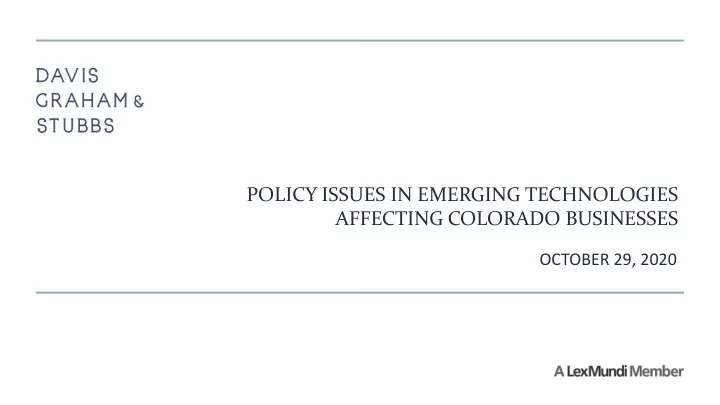

POLICY ISSUES IN EMERGING TECHNOLOGIES AFFECTING COLORADO BUSINESSES OCTOBER 29, 2020
HOT TIME FOR TECH POLICY 2 dgslaw.com
AGENDA: SOME KEY TOPICS AFFECTING COLORADO ▪ Regulation of Tech-Related Supply Chains ▪ Data Privacy – Federal and State Legislation ▪ Regulation of Artificial Intelligence & Facial Recognition 3 dgslaw.com
R EGULATION OF T ECH -R ELATED S UPPLY C HAINS
SUPPLY CHAIN THREATS ▪ Targets for Made in China 2025 terrorists and rogue nations ▪ Targets for economic espionage & coercion 5 dgslaw.com
REGULATORY TOOLS TO SECURE SUPPLY CHAIN ▪ Review of transactions and investments ▪ Executive orders directed at industries or specific transactions ▪ Express limitations and prohibitions Bottom line : Due to national security implications, federal government has broad authority to regulate 6 dgslaw.com
PRIORITY MARKETS FOR PROTECTION ▪ U.S. Military and Defense Industrial Base ▪ Federal, State, and Local Governments ▪ Critical Infrastructure (including Energy) ▪ Advanced Manufacturing ▪ Cloud Networks and IoT Infrastructure ▪ Healthcare and Pharmaceuticals ▪ Data-Rich and Internet-Connected Consumer Markets ▪ Educational Institutions 7 dgslaw.com
CASE STUDY: DRONE INDUSTRY 8 dgslaw.com
IMPACTS ON COLORADO – AFFECTED INDUSTRIES ▪ Advanced Manufacturing ▪ Finance ▪ Aerospace ▪ Food & Agriculture ▪ Bioscience ▪ Health & Wellness ▪ Defense & Homeland ▪ Infrastructure Security ▪ Technology & Information ▪ Electronics ▪ Energy 9 dgslaw.com
F EDERAL & S TATE P RIVACY LEGISLATION
PRIVACY LEGISLATION – FEDERAL LEVEL ▪ So far, the U.S. has taken a sectoral approach to regulating privacy – E.g., HIPAA, GLBA, COPPA, FCRA, TCPA, CAN-SPAM ▪ Increased push for U.S. federal comprehensive privacy legislation – Over 30 privacy-related bills introduced in this Congress session so far – Most recent bill introduced: the SAFE DATA Act • Combines three previously introduced bills and would provide new data rights, require consent for processing and sharing personal information, and require companies to appoint a data protection officer – Congressional hearings on privacy • U.S. Senate Committee on Commerce, Science and Transportation hearing 9/23/2020 on the Need for Federal Data Privacy Legislation ▪ Main sticking points: – Preemption of state law – Private right of action 11 dgslaw.com
PRIVACY LEGISLATION – STATE LEVEL Bills Introduced 2019/2020: ▪ Arizona Topics covered: ▪ Connecticut ▪ ▪ Florida Consumer rights ▪ Hawaii – Access and Portability, Deletion, ▪ Illinois Correction, Non-discrimination ▪ Maryland – Opt-in vs. Opt-out ▪ Massachusetts ▪ Minnesota ▪ Transparency and Accountability ▪ Nebraska – Privacy notices, privacy risk ▪ New Hampshire assessments ▪ New Mexico ▪ ▪ Data security New York Laws Enacted: ▪ North Dakota ▪ Relationships with service providers ▪ California - CCPA ▪ Pennsylvania ▪ ▪ Maine - ISP Private Right of Action ▪ Rhode Island ▪ Nevada - Sales opt-outs ▪ Texas ▪ Fiduciary duty to individuals ▪ Virginia Draft Bill: ▪ Washington ▪ Colorado (not introduced) ▪ Wisconsin 12 dgslaw.com
COLORADO PRIVACY ACT (DRAFT) ▪ Consumer rights – Opt-in, opt-out, access, correction, deletion, data portability – 30 days to respond (with a 30-day extension allowed) – Appeals process where covered entity refuses to take action ▪ Duties of covered entities (“controllers”): – Transparency (Privacy Notice) - Avoid secondary uses – Purpose specification - Duty of care (data security) – Data minimization - Avoid unlawful discrimination ▪ Data Protection (Risk) Assessments required for processing activities posing a heightened risk of harm – Includes targeted advertising, sale of personal data, profiling, and processing sensitive data – Assessments must be made available to the AG upon request ▪ No private right of action 13 dgslaw.com
R EGULATION OF A RTIFICIAL I NTELLIGENCE & F ACIAL R ECOGNITION
ARTIFICIAL INTELLIGENCE – KEY QUESTIONS ▪ Regulation at federal, state, and local levels – Lots of talk, but not much action so far from feds – States and local governments taking the lead ▪ Determination of liability under state laws 15 dgslaw.com
ARTIFICIAL INTELLIGENCE – LIABILITY ▪ Who is at fault when AI causes harm? 16 dgslaw.com
ARTIFICIAL INTELLIGENCE – LIABILITY ▪ Examples – Car crashes – Discriminatory personnel decision-making – Products liability ▪ Issues – Who is responsible (operator, designer, the AI itself?) – What level of care – How to establish causation – Other open questions ▪ Approaches – State common law – State or federal statutory or regulatory regimes 17 dgslaw.com
REGULATION OF FACIAL RECOGNITION IN THE U.S. ▪ Several cities, including Boston, Oakland, and San Francisco have banned the use of facial recognition by law enforcement. Portland’s ban extends not only to law enforcement but to corporate use in public spaces. ▪ Washington State passed a facial recognition law in March 2020. The new law, which takes effect July 1, 2021, regulates the use of facial recognition technology by state and local government agencies, without banning the technology outright. ▪ Several companies have weighed in, too. – Microsoft will not sell facial recognition software to police departments until the federal government passes legislation regulating the technology. – Amazon instituted a one-year moratorium on policy use of its technology. – IBM announced it would no longer sell facial recognition products. 18 dgslaw.com
USE OF FACIAL RECOGNITION IN COLORADO ▪ Colorado has no laws regarding the use of facial recognition software ▪ Law enforcement and other state agencies use facial recognition for investigative purposes – Typically rely on agency and private databases ▪ Key issues: accuracy, corroboration, transparency, privacy 19 dgslaw.com
CONTACTS Mark Champoux Camila Tobón Davis Graham & Stubbs LLP Davis Graham & Stubbs LLP mark.champoux@dgslaw.com camila.tobon@dgslaw.com 20 dgslaw.com
Recommend
More recommend